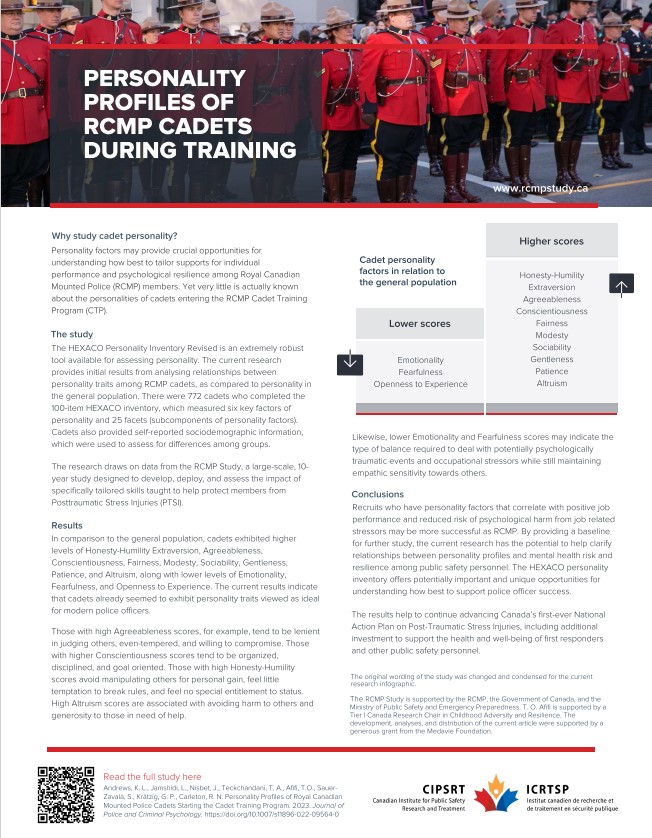Research Summaries
Why was the study done?
Very little is known about the personalities of cadets entering the Royal Canadian Mounted Police (RCMP) Cadet Training Program (CTP), and how they may differ to those of the general population. Personality factors are often used to try and predict future positive job performance and resilience to psychological harm.
Using an assessment tool known as the HEXACO Personality Inventory Revised – a potentially more robust scale than the commonly used Five Factor Model of Personality and others currently used to assess personality – this research provides a first analysis of personality trait, sociodemographic, and gender differences among RCMP cadets and compares these to those of the general population.
What was done in the study?
The current research draws on data from a larger, 10-year RCMP study designed to develop, deploy, and assess the impact of skills taught to help protect members from Posttraumatic Stress Injuries (PTSI). A research summary of the previously published Study Protocol can be read here.
As part of this larger study, volunteer participants were cadets beginning the RCMP CTP. A total of 772 participants (45.5% of the total number of cadets invited to participate) completed the HEXACO Personality Inventory Revised, a 100-item, self-reporting survey that measures six factors of personality (i.e., Honesty-Humility, Emotionality, Extraversion, Agreeableness, Conscientiousness, Openness to Experience) and 24 facets (subcomponents of these personality factors) along with self-reported sociodemographic information.
These data were compared to personality trait data from the general population, consisting of HEXACO data sampled internationally from Canada, USA, UK, and Australia. For those interested the test is available at: http://hexaco.org/.
What did we find out?
The results indicated differences between cadets starting the RCMP CPT and the general population on several personality factors and facets, and also between men and women cadets. There is also evidence of differences between cadets based on certain sociodemographics, such as age, education, and province of residence.
There were several important personality factors and facets that may be indicative of cadets already exhibiting behaviour ideal for police officers. The HEXACO personality inventory provided additional and more nuanced information on some key personality traits, potentially providing valuable insights for recruitment.
Where do we go from here?
Choosing recruits who have personality factors that correlate with positive job performance and reduced risk of psychological harm from job related stressors is crucial. The current research has the potential to clarify relationships between personality profiles and mental health risk and resilience among public safety personnel, and could have important implications for law enforcement agencies by highlighting potential advantages of including the HEXACO personality inventory.
The results help to continue advancing Canada’s first-ever National Action Plan on Post-Traumatic Stress Injuries, including additional investment to support the health and well-being of first responders and other public safety personnel.
The RCMP Study is supported by the RCMP, the Government of Canada, and the Ministry of Public Safety and Emergency Preparedness. T. O. Afifi is supported by a Tier I Canada Research Chair in Childhood Adversity and Resilience. The development, analyses, and distribution of the current article were supported by a generous grant from the Medavie Foundation.
The original wording of the study was changed and condensed for the current research summary.
Original study:
Andrews, K. L., Jamshidi, L., Nisbet, J., Teckchandani, T. A., Afifi, T.O., Sauer-Zavala, S., Krätzig, G. P., Carleton, R. N. Personality Profiles of Royal Canadian Mounted Police Cadets Starting the Cadet Training Program. J Police Crim Psych (2023). https://doi.org/10.1007/s11896-022-09564-0
Prepared by K. Vincent
